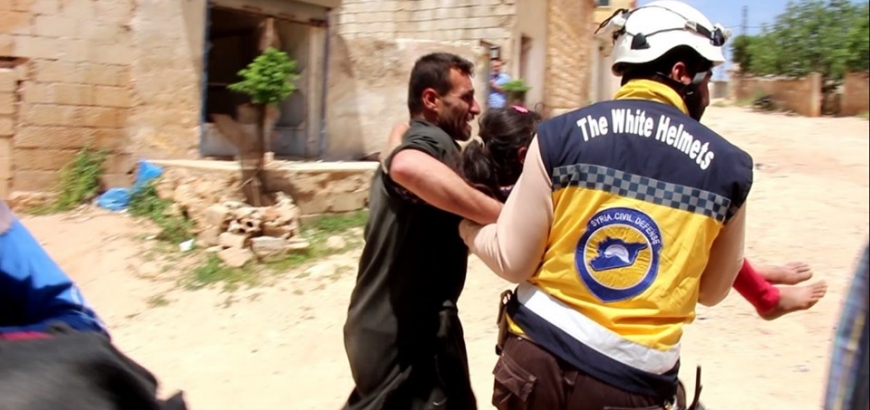For the seventh day in a row, Russian and Syrian regime warplanes carried out the heaviest bombardment on the fourth de-escalation zone in Syria since Moscow and Ankara announced a freeze on all forms of hostile operations in northern Syria during the Sochi summit in mid September.
Air and artillery bombardments by the regime forces and its Russian ally hit the towns of Ltamenah, Kafr Zeita, Kafr Naboudeh, and villages in Sahel al-Ghab and northwest Hama.
Warplanes and helicopters also carried out raids on towns and villages in Jabel al-Zawiyeh, and the towns of Khan Sheikhoun, Maarat Nouman and Saraqeb in southern Idleb, which killed at least 40 people including women and children, as well as seriously wounding dozens and inflicting major damage on infrastructure.
The bombardment area, which included barrel bombs, expanded to include the Ariha countryside and the village of al-Mastoumeh, adjacent to the center of Idleb city.
The director of the medical center in Khan Sheikhoun, Doctor Abdel Qader Najem, said that medical staff in southern Idleb had registered the deaths of more than 200 people and treated 50 others for wounds since the beginning of the artillery and air bombardment campaign in March 2019.
He said that regime and Russian aircraft had, “put a number of medical points and Civil Defense centers in southeast Idleb out of service after concentrated strikes.” He warned of an “imminent humanitarian disaster if the bombing of hospitals continues.”
According to a medical source talking to Al Jazeera, dozens of wounded people were unable to be treated during the airstrikes on medical points and staff, which led to a notable increase of number of civilians killed in recent days.
Alaa Youssef, a resident of Khan Sheikhoun said that strikes on his town were a “campaign of annihilation in every sense of the word,” telling Al Jazeera that: “the planes are in the sky around the clock, striking homes, mosques, hospitals and schools in an indiscriminate fashion. Only a few families are left in the town, as everyone else has fled to the camps.”
Abou Ahmed Abed, a resident of al-Habeit expressed his fears that the regime will embark on a military campaign to take control of the southern Idleb countryside, adding that: “I avoid the danger of the bombing now by staying in the shelter, which I previously prepared under the house, but I’m afraid of the regime advancing on the ground, at which point I’d lose my house forever.”
Signs of Battle
Coinciding with the wave of bombardments that are shaking the last stronghold of the revolution in northern Syria, the armed opposition’s National Front for Liberation announced that it repulsed an attempt by regime forces to advance on the Qalaat Madiq front in Sahel al-Ghab in the western Hama countryside.
The Front published a video showing its fighters destroying regime troop transporters during clashes that broke out at the al-Makatab and al-Athar checkpoints in the western Hama countryside.
According to the National Front for Liberation spokesman, Colonel Naji Mustafa, regime forces, “recently sent major military reinforcements to the front lines in the northwestern Hama countryside.”
Mustafa said in a statement to Al Jazeera that: “the armed opposition in all its formations is planning to launch attacks on vital areas held by the regime in Aleppo and Hama provinces if the military escalation continues,” adding that, the defensive and offensive plans the opposition prepared, “will surprise the regime and its allies and prevent them from achieving gains on the ground.”
Media activist Wael al-Khalidi said that the agreement between Moscow and Ankara around Idleb “had hid in its contents items that are beginning to unfold with the current escalation.”
He said that Russia was, “counting on Turkey to fail to contain the radical factions and put pressure on them with heavy bombardments and diplomatically through Putin’s statements and his ministers.”
But he predicted that Moscow is: “not currently willing or able to launch a major military operation in Idleb because of the growing dispute with Iran, which is trying to expand its influence in regime institutions.”
Khalidi noted that the continuation of the escalation and the expansion of its sites into northern Syria “is torpedoing the Astana track and collapsing the agreement between the three guarantor countries.”
This article was translated and edited by The Syrian Observer. Responsibility for the information and views set out in this article lies entirely with the author.


